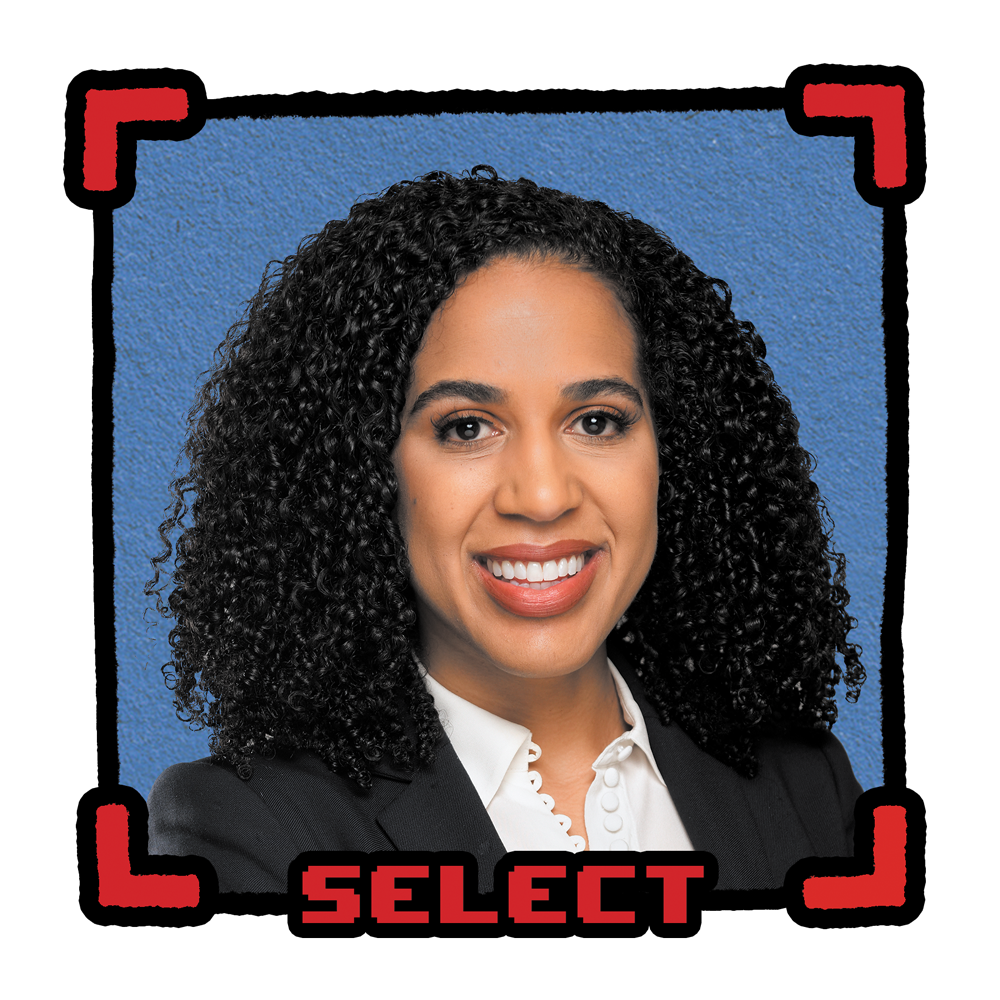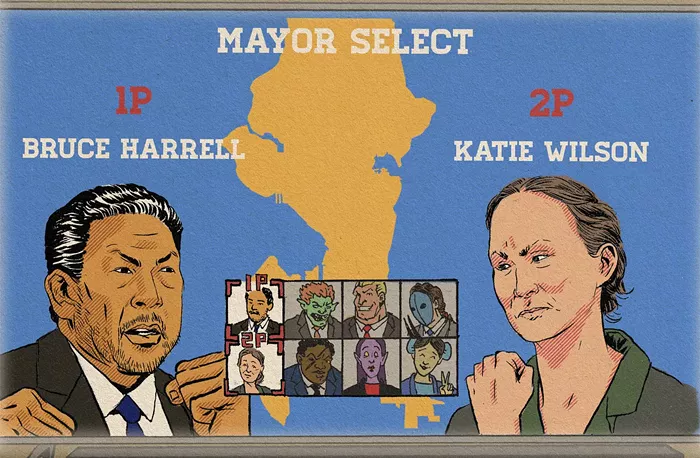It’s the Primary Election 2025. We’re taking over the city. Choose your fighter.
We know it’s easy to miss these odd year elections. They’re local! They’re wonky! There’s not a President in sight. Maybe you’ve used up all your fucks and your will to live watching the world sputter and burn. Or maybe you spent them watching our city government waste everyone’s time building digital advertising kiosks, painting over graffiti, trying to weaken our ethics code, and allowing cops the ability to lob blastballs into protests once again instead of finding ways to protect us from a robber baron and literal fascists.
But please vote. Please please please. This year, we have the chance to swap big business politicians for scrappy progressives across the ballot. (Sara Nelson is up for reelection. Need we say more?) And if we seize the opportunity, we can also maintain the proud Seattle tradition of one-term mayors. In just a few months, we could say goodbye to the mayor who couldn’t even keep the one promise he cared about (bringing back the Seattle SuperSonics). The mayor who never managed to find a vision for Seattle’s future, because he was busy sweeping the homeless people out of downtown and into Little Saigon. But you’ll never see him holding the broom—because he’s unable to lift a finger, let alone take responsibility for this city.
Seattle has rarely—if ever—allowed itself the luxury of having a progressive mayor and a progressive city council at the same time, because we’re masochists who get our rocks off at complaining about the Seattle Process. Right now, this city is currently run by vampires. Let’s take a bath in free-range fair-trade certified organic holy water and fashion a stake from lab-grown (or ethically sourced) balsa wood and get out there.
This year, dare we say it, there’s a roster of honest-to-goodness actual progressives that are looking for a chance to totally transform Seattle. And they couldn’t have come at a better time. We’re staring down the pike of a Seattle comprehensive plan that will steer the next two decades of growth and infrastructure on these near-suburban streets. We’ve got a lot of work to do if we don’t want the Seattle of the future to be a charming little hamlet with $4,000-per-square-foot rents, nary a corner store in sight, and unionized robocops arresting “the nipple” at the behest of an anti-socialist neural network that’s named itself Jeff Bezos 2. So listen up, we’re choosing our mayor, our city attorney, our county executive, and three city council seats—and that’s not even the whole ballot.
In the last month, we sat down with (almost) all of the candidates. They made their case. They brought us snacks that sometimes we were allergic to. Nobody even cried this year, but they screamed a lot. Idiot aside, we heard a lot of exciting ideas from inspiring people politicians.
Uh oh, is our optimism showing? We hate when that happens. But if the best of the best get elected, we’ll go full frontal. Because right now we simply cannot resist the potential dripping from these ballots. Let’s fantasize for a sec: City Council District 2 is going to have a new champion. Pro-business, anti-protester (evil) Council President Sara Nelson has a real challenger in Dionne Foster. And we’re pouring our hope into Katie Wilson to once and for all send Bruce Harrell packing.
You should get your ballot around July 18. If you don’t know what to do with it, we have a guide on page 20. Let’s go. We’ve got a city to fix.
City of Seattle
Mayor
Katie Wilson
Bruce Harrell had his chance.
A lifetime ago (in 2021), when Harrell first ran for mayor, he made a lot of big, substantive promises that voters seemed to believe: He pledged to build 1,000 new housing units in his first six months in office; he committed to changing the biased policing culture in SPD after the George Floyd protests; he said he didn’t believe “dispersal,” or sweeps, worked, and promised to take a “Housing First” approach to encampments around the city. Are we living in a utopia yet?
In our endorsement meeting, we asked about his broken promises. We pointed out that he conducted more sweeps than his five predecessors combined. That he sunk years of municipal effort and energy into a Comprehensive Plan that won’t meet our housing needs. That he pandered to police with bruised egos, letting them become the militant thugs that we saw in Cal Anderson on Memorial Day weekend, but with higher salaries. And in an hour-long endorsement meeting, he didn’t answer for a single thing. In every case, the conditions in his city were someone else’s fault. Homelessness? The other cities in King County aren’t doing their part. The police that he says can take a hike if they don’t agree with his idea of good policing? Well, he told us, he doesn’t actually know what good policing is. They’re the experts, not him. Nothing was his responsibility.
We understand why he would feel that way. Because the greatest sin of the Harrell Administration is what it hasn’t done. He’s a mayor without imagination, and with him at the helm, Seattle is a rudderless ship on a windless ocean. While tens of thousands of Seattleites are struggling to keep their head above water, he’s obsessing over penises spray painted on the overpasses, AI incubators, and digital advertising kiosks that profit private companies.
There’s a perception that this race was Harrell’s from the start, so there was no use doing anything to stop him. But that’s not the case. In polling this spring, only 37 percent of Seattleites were happy with Harrell’s work in City Hall. Enough of Seattle is sick of the Harrell Show.
Katie Wilson is Harrell’s opposite. If Harrell is all politics and no substance, Wilson is substance embodied. She’s been an organizer in Seattle for 15 years, and she’s built a career fighting for—and winning—campaigns like raising the minimum wage, protecting affordable transit, and building progressive revenue.
Wilson’s campaign platform is clearly made by someone who’s used to making change in a system that’s built to fight against it. She has clear, step-by-step plans to build 4,000 units of shelter in four years, to streamline access to addiction and mental health treatment, and to build $1 billion worth of union-built affordable housing. Harrell made promises. Wilson actually intends to keep hers. And she knows how to do it.
In our meeting, one question best captured the difference between Wilson and Harrell. We asked about the FIFA World Cup coming to Seattle in 2026. When Seattle hosted the MLB All-Star game in 2023, the city swept any encampments in the area out of sight. Surely, next year, Seattle’s mayor would have to field a fair amount of outside pressure to make visible homelessness invisible while the world’s eyes are on us. How would they respond?
We gave Harrell two chances to answer the question, and he never did. Instead, he ranted about how our surrounding cities aren’t building as much shelter as we are, how he has to prioritize small businesses, said it was his responsibility to revitalize downtown, and reminded us that he signed an ordinance to make Seattle a Human Rights City. Then he turned to the other candidates, and said: “How dare you talk about the values I’ve been a part of for the last 16 years.”
Wilson, meanwhile, rejected the premise of the question entirely. Not because she didn’t want to answer it, but because she had a plan to stand up enough shelter in the first six months of her term—between tiny home villages, faith communities, and vacancies throughout the city—to make the question irrelevant. “Let’s get people inside in time for the World Cup,” she said.
See that, Harrell? No excuses, just a goal, a plan, and a timeline. This is why Wilson has our vote. She sees people that are struggling and thinks about solutions, not optics. She obviously, palpably gives a damn about people, and that drives her to act, not just talk.
While we were writing this endorsement, Zohran Mamdani, a Democratic Socialist with a people-first platform, wiped the floor with an establishment Democrat in New York City’s primary. Mamdani’s win is proof that people can show up in droves and throw decades of political tradition in the trash and choose something better. And that to accomplish such a feat, being a hell of a politician with a great personality helps a fuckton.
Wilson has the platform. What she doesn’t have is the energy. She’s quiet. She’s policy minded. She makes deeply awkward TikToks. But she knows her shit and she cares. Wilson doesn’t pull out the tear-jerking stump speech or throw down with her opposition. And while we trust that your vote will get her through the primary, we need her to throw down. Show everyone that Harrell’s empty, that he’s unelectable this time. This city wants to see that. And it wants change. Do what you need to do to give the people what they want. Show us your spine is as sturdy as that platform. We know it’s in you.
Now reader, we know that Wilson isn’t the only one making a run for Harrell’s graffiti-less office (and Joe Molloy, we hope to see you run for City Council, where your good heart, and brains, would be appreciated), but she’s the only one who has the secret sauce we need to see: one-part great ideas, one-part the knowledge and experience to pull them off, two-parts the willingness to leave an easier life as an organizer to serve the city when she thinks she’s needed. We just need her to add a little heat to that sauce.
If you’re still wondering if dethroning Harrell is the right decision, we’ll leave you with one more detail. For the last year, members of his administration have talked about the misogyny, bullying, and literal chest beating in City Hall since he’s been in office. We had Mayor Harrell in our conference room for just under an hour, and in that time, he did nothing to convince us that his reputation was not a completely accurate characterization. We lost count of how many times he pounded his fist onto the table and stomped his feet, and we had to shout over him more than once to stop him from yelling at other candidates. Harrell somehow made Joe Mallahan look good (well, not that good). He took control of the room—not the way a charismatic speaker captures an audience, but the way your angry uncle sucks the air out of the room on Thanksgiving. Our civic self-esteem cannot be so low.
Don’t make the mistake of thinking that we need a strong, bullish personality at the helm of our city to combat everything that Trump promises to rain on us in the next three and a half years. Mayor Harrell has shown us, time and time again, that all he’s going to do is bully Seattle, not Trump. And we can’t afford that. Wilson may be quiet. But she has values.
Seattle has a time-honored tradition of producing one-term mayors. Let’s make Harrell one of them. Vote Wilson.

City Attorney
Erika Evans
In case you’ve been living under a rock for the last three-and-a-half years, let us brief you on our current City Attorney: the regrettable Republican Ann Davison.
The City Attorney has two jobs: one criminal (prosecuting all of the city’s misdemeanor cases, like DUIs and domestic violence charges) and one civil (acting as the city’s attorney, either suing people or other governments and also defending Seattle in court when, for instance, the Seattle Chamber of Commerce sues the city to kill the JumpStart tax).
From a criminal perspective, Davison’s whole thing is being “tough on crime,” which famously does nothing to make our city safer or to get people on the streets the help they need. She instituted policies like Close-in-Time filing. Implemented in 2022, it’s meant to reduce the criminal case backlog, but really just places the backlog in a different pile. It hasn’t worked. Her “High Utilizer Initiative” to target frequent offenders, surprise, also doesn’t solve any problems and worsens recidivism. Plus, Davison killed “community court,” an alternative system that offers people charged with misdemeanors non-punitive options to resolve their cases.
Meanwhile, Davison is unforgivably behind on filing DUI cases—one of the two serious misdemeanors the office can prosecute. Domestic violence cases are lagging. Back in 2021, before Davison, it took 26 days to file a DV case. Last year, on average, it took twice as long.
Davison is a tumor on the city and we don’t expect her to be willing to stand up to Trump. She converted to the Republican party during DJT’s first term, when anyone with an ounce of sense jumped ship. When King County, San Francisco, Santa Clara County, Portland, and New Haven signed onto a lawsuit against the Department of Homeland Security for their attacks on “sanctuary jurisdictions,” Davison dragged her feet, only joining the lawsuit months later. Meanwhile, while Boston and 43 other cities (including our less progressive neighbors, Spokane and Olympia) fought cuts to federal research funding, Davison stayed out of it. This person cannot protect us from the next three-and-a-half years (or more) of authoritarian encroachment.
So, she sucks. We can’t let her win again. And she could. With three progressive challengers splitting the left vote, Davison will almost certainly skate through the primary, liberal Seattle bubble be damned. The people who didn’t march in the No Kings rally get ballots, too!
Of this bunch, we believe Erika Evans, a former assistant US Attorney, is our choice to best Ann, make the City Attorney’s office effective and fair, and protect Seattle from the Trump administration.
Evans has prosecuted hate crimes, she’s gone after drug traffickers, she’s slapped the wrists of business owners dipping into their employees’ wages, and she was involved in a case prosecuting January 6ers from Puyallup. Her résumé is impressive. Her platform (speed up DUI and DV case filings, bring back community court, prosecute wage theft, improve the police union contract to allow for more policing alternatives) mirrors the platforms of her opponents. But they don’t have her grit.
In our meeting, Evans leapt for her opponents’ throats. She presented exhibits for every argument, and demonstrated a deep understanding of the power, and limitations, of the City Attorney’s Office. She spoke thoughtfully about the importance of working closely with Washington Attorney General Nick Brown against the constitutionally intolerant Trump administration, and made a commitment to not prosecute “peaceful” protesters (though she wouldn’t define a “peaceful protester” for us, which is peak prosecutor brain).
We also love a prop comedian: she brought Jarritos and African Black soap to symbolize SOAP/SODA laws, a Raggedy Ann doll to represent Davison, a printout of photos of the white men who have held this office for the 150 years before Ann got the job, a binder of her and her opponents case files. Sure, she gave Model-UN vibes, and if being corny were illegal this woman would be in jail. But it isn’t. And what we care about is Evans’s ability and will to protect us when Trump goes after this city.
We know, we know. A history as a prosecutor brings with it a track record of upholding a system built for oppression. But our federal government is actively antagonistic to cities like ours, and a prosecutor knows how the federal government works. Evans knows what levers to pull. And local progressives such as City Councilmember Alexis Mercedes Rinck and State Rep. Shaun Scott believe she’s the right choice despite all the prosecutorial baggage.
But we don’t discount her mistakes and our misgivings. Evans voted for Bruce Harrell last election (“But I voted for Nikkita Oliver twice when they ran,” Evans said). She donated $100 to Harrell’s campaign before Katie Wilson got into the race, but wouldn’t say whom she was voting for in this election, and hedged by saying she couldn’t talk shit when the winner could be her client. Public defenders are worried about what her real intentions are and how she’ll act when she’s in the seat of power. We understand where they’re coming from. But we’re inviting her to prove them wrong.
This wasn’t an easy decision. Any of Davison’s challengers would be wildly better for Seattle. We wish we could have endorsed Nathan Rouse, the public defender running for the seat, because he knows the system doesn’t work for everyday people and wants to change it. He’s tougher on the Seattle Police Officers Guild than any other candidates. But he didn’t convince us he could put his ideas into action or win. Please run again next time, Nathan. We want to see you in our swivel chairs again, with more experience under your belt. Thanks for the Pop-Tarts.
And Rory O’Sullivan could do a perfectly fine job in the role. But he lacks trial experience. And most importantly, we aren’t confident he could beat Davison.
Evans will hit the ground running in a way we need. Here’s to knocking Davison into the stratosphere. Vote Evans.

City Council, District No. 2
Eddie Lin
We didn’t know what kind of fresh hell we were in for when District 2 City Councilmember Tammy Morales bowed out of office one year into her second term. The appointment process sucked; the unimaginative snoozers on the city council selected multiple-SECB-endorsement-loser Mark Solomon to take the seat. Luckily, Solomon isn’t running to keep the seat, so we have an open race on our hands!
Which brings us to the pool of four viable D2 hopefuls: Union guy and SDCI inspector Jamie Fackler; restaurant organizer and activist Jeanie Chunn; assistant city attorney Eddie Lin; and mayoral transportation engagement manager Adonis Ducksworth.
After a lively (read: tense, yell-y) discussion, the clear choice for D2 is Eddie Lin. As an assistant city attorney, Lin’s focus for the last several years has been working with the Office of Housing. When it comes to housing, and building more of it, Lin knows his stuff. In the midst of a never-ending housing crisis and a new Social Housing Developer on its way through the Seattle Process’s long birth canal, we need someone who can get shit done. Lin knows we need subsidized affordable units, social housing, limited equity co-ops, and everything else under the sun to get people four walls and a roof. Plus, whoever sits on council will implement Mayor Bruce Harrell’s Comprehensive Plan. Lin, a fiend for density and walkable neighborhoods, is a smart choice to kickstart the next 20 years of Seattle’s growth.
One of the main hits against Lin, as Fackler repeatedly brought up, was that he didn’t go all out championing Proposition 1A, the voter measure that set up a funding mechanism for the Social Housing Developer. Lin didn’t vote for it because, as a housing wonk, he was concerned that it was vulnerable to being undermined by a more conservative, Chamber-backed City Council. However, he says he’s come around and is ready to champion it.
He’s also a total slut (sorry, Eddie) for progressive revenue. He’s DFAIT (Down For An Income Tax), a vacancy tax, and a city-level capital gains tax. We liked Chunn’s idea for a commercial vacancy tax, but felt she was still a little too green to hack it in City Hall. We hope to see her again.
The other knock against Lin is, like all other candidates except Chunn, he wants more cops. Lin’s desire for increased police presence does go hand-in-hand with hiring a more diverse police force and expanding police alternatives. Plus, Lin’s experience with police brutality made him wary of cops. In his 20s, a Minneapolis police officer cuffed him, put his hands on his throat, and made racist comments—confusing Lin, who is Asian, for a Native American. The rattling experience forever changed Lin’s view of policing. We felt Fackler, while progressive and knowledgeable about the same issues, was too soft on the cops, especially their union.
We’re certain Ducksworth will win the Seattle Times endorsement. He’s suave, charming, and doesn’t answer a single question. He’s also fucking cool. Sadly, underneath his skater chic, Ducksworth is nothing but a visionless moderate (read: Bruce Harrell). We already doubted he’d be our guy from the start, and he did us a solid by confirming that with a shitty, uninformed comment blaming drug users for their own predicament.
“I did the ride along last week, and these guys asked at least 50 people, are they ready to go to treatment? We got one. We got one. So this comes down to the person on the street, too. Who wants to get off the street,” Ducksworth said.
“That’s because some of the treatment options are not—,” Lin said.
“They’re not asking about the treatment options,” Ducksworth interrupted. “They’re getting high.”
Ducksworth’s mask came off. We did not like it under there.
So, Lin is our guy. He’s the whole package. He’s a cat guy and a dog guy. He’s a public schools champion. This is why we willfully turned a blind eye to the fact that he could only name two examples when asked what his four favorite films were and one of them was White Lotus Season 1, famously not a movie. If he’s even seen a movie, he wasn’t paying attention. There weren’t enough housing solutions for his taste. Vote Lin.

City Council, Position No. 8
Alexis Mercedes Rinck
When we endorsed Alexis Mercedes Rinck in 2024, we had a lot to say about what she wouldn’t do: She wouldn’t stoop to a lower minimum wage, she wouldn’t make it easier for landlords to evict you, she wouldn’t reduce oversight on cops, she wouldn’t help corporations hoard more wealth.
That was because we knew that if she was elected, she (and at the time, Tammy Morales before she was bullied out of City Hall) would be a progressive in a sea of conservatism. As we hoped, she pushed back: She voted against giving SPD more access to “less lethal” weapons, and when her colleagues approved additional surveillance from law enforcement, she opposed it.
But more important than what she didn’t do is what she did. Despite being on council with people allergic to helping the city, Rinck found other ways to show up. She supported counterprotesters at a Christian Supremacist group in Cal Anderson, and was instrumental in convincing the city to deescalate the situation. She spoke out at the committee hearing when Council Member Cathy Moore tried to defang our city’s ethics code, even though she wasn’t on that committee (and even though Council President Sara Nelson tried desperately to shut her up). Rinck knows that being on city council gives her a voice, and she’s shown us over and over again that she’s willing to use it for ordinary people.
She’s also clearly the voice we need to start fixing our ass-backward revenue streams in Seattle. Just weeks after our endorsement interview, she presented a collaborative effort with the mayor to reform our tax code to reduce the taxes that small businesses are paying, shift the burden to big business, and raise an extra $90 million in the process. Now that’s what we call progressive revenue!
Rinck doesn’t have much competition in this race. Her standout opponent is Rachael Savage, who quite frankly fascinates us, even if we had to sage the office after she left. A Republican with chunky jewelry and overlined lipstick who started the election season running for mayor, Savage switched to a City Council race just before the filing deadline. She owns a new-age shop on Capitol Hill, runs a meditation program, and believes that her experience getting sober justifies her argument that people who are mentally ill or dealing with “late-stage” addiction should be shipped to facilities for Shiny Happy People outside of the city. Oh, and she told us words are never violent and hate speech doesn’t exist.
This election has the chance to reshape our city council into a functioning governing body (would we even recognize it?) and we want to see what Rinck can do when she’s not swimming upstream. Vote Rinck.

City Council, Position No. 9
Dionne Foster
Seattle will not have a functional city government until Sara Nelson is KO’d so far out of our political orbit that she’ll be nothing more than a footnote: a forgettable, one-time City Council President who reigned over this legislative body during a remarkably chaotic and useless time in its history.
At this point, progressives would endorse a cinder block over Nelson if it had a pulse and a fixed Seattle address. Fortunately, we don’t have to. Because we have Dionne Foster, an excellent candidate for this office. Rejoice!
Foster, a former policy advisor for the city and the former executive director of the nonprofit Washington Progress Alliance, is a knowledgeable, likable, competent wonk. She wants to lead the way on economic justice. Stop this city’s affordability crisis and addiction to sweeps from displacing people. She’ll fight conservatives on this council willing to divert JumpStart funds from affordable housing. Unlike Nelson, Foster knows Seattle must go harder for housing density than the legal minimum set by the state and that it’s unrealistic for a real city expecting major growth in the next two decades to click its ruby red heels, ignore its housing needs, and remain an overgrown, dysfunctional suburb forever.
Foster also wants to embrace affordability and outrun Washington’s regressive tax code with progressive revenue. She wants a municipal capital gains tax, a vacancy tax, and working with the state on a mansion tax. She has the right plans and can articulate exactly how she’d implement them, a rare quality on our curb-busting city council. She’s granular, but not myopic. And we believe her because she already did this work at the state level to pass the limited capital gains tax
Foster has earned a heap of endorsements from politicians like Congresswoman Pramila Jayapal, State Rep. Shaun Scott (D-43), and Scott’s dearly departed predecessor, Frank Chopp, because she is the best, quickest-witted candidate to walk through our door this election cycle. With two other seats up for reelection, that’s a chance she won’t be a progressive island on council.
Nelson, on the other hand, is a fundamentally un-democratic chaos agent and a disastrous leader whose sole purpose has been to accumulate political power. Her Council’s “accomplishments” have been wildly unpopular: Approving a police contract with big raises and no accountability? Putting blast balls back in the hands of untrustworthy cops, and ensuring they can surveil us? Establishing “stay out” zones for drug users and sex workers that stigmatize people and don’t work? Attempting to weaken our ethics code and repeal protections for gig workers? We’re embarrassed.
Seattle is immobilized in Nelson’s… full Nelson, controlled by business interests who shelled out hundreds of thousands of dollars for her meandering status quo that squeezes the renters, the poor, the homeless, and the disadvantaged on the margins. A skilled politician at least pretends to listen. Nelson is either incapable or indifferent. She shuts down anyone who is too loud and cumbersome for her taste. Her hostility for representative government and working people is boundless. But in her hallowed chambers at least we’ll have decorum, won’t we?
Her contempt for the public seemed like the only reason competitor Connor Nash, a former state and federal employee, joined this race. Mia Jacobsen, on the other hand, is running a protest campaign to overhaul the system that puts people like Nelson in the driver’s seat. Nash was angry, shooed away too many times.
But Nelson isn’t just the rock and the hard place. She’s a liability. A threat to reforms from a more progressive council, a roadblock to desperately needed progress on housing and homelessness, and the last person we want in city government when President Donald Trump comes to play. We’re tired of incompetence. We want someone with ideas, who loves this city and its people. A vote for Nelson is a vote for nihilism. A vote for Foster is a vote for intelligence, compassion, solutions, and a chance for a future.
Vote Foster.
Proposition No. 1
Vote Yes
If you’re registered to vote in Seattle, you’ve probably had a chance to see the Democracy Voucher Program (DVP) in action: a blue and white envelope arrives in your mailbox with a small stack of $25 coupons; you, the voter, are invited to spend them on any candidate you like. It’s Seattle’s own, first-in-the-nation public campaign financing program. And Proposition 1 asks if we want to renew the levy that funds it for another decade.
The new levy would be funded through a property tax, and it’s expected to raise $45 million over 10 years, costing the average homeowner $12.20 a year.
By most metrics, the DVP has been a roaring success. It makes primaries more competitive and campaigning accessible to more diverse candidates, and the vast majority of people running for office in Seattle participate in the program. More than 106,000 Seattleites have slipped their vouchers to candidates, and according to the City, through 2024, we’ve distributed more than $10 million to local campaigns.
It’s difficult to find opponents to the DVP (the opposition statement is written by right-wing radio host Ari Hoffman). But supporters of the program still have complaints. The most common concern is that when we introduced the Democracy Voucher Program (which limits the amount of money a candidate can accept), spending from lobbyists skyrocketed (which remained unlimited). But lobbying spending has shot up across the region, not just here in Seattle. And even if it did push lobbyists to up their game, it’s also one of the few tools we have to combat them.
There’s a reason that there isn’t any organized opposition to Proposition 1. It’s a new, promising program that deserves time to shake out its minimal kinks and prove to other cities that it’s worth it. Our democracy is already under attack. Now isn’t the time to defund one of the projects that makes democracy just a little bit more accessible. Vote yes on Proposition 1.
Schools

Seattle School District No. 1, Director District No. 2
Kathleen Smith
We were so unimpressed with the Seattle School District position 2 incumbent, Sarah Clark, that we are endorsing the person who didn’t even have her website set up at the time of the endorsement meeting (it’s set up now!).
Kathleen Smith is a data scientist at Microsoft. She’s soft-spoken until a topic she’s passionate about like, say, gay kids or anything about data comes up. Then she’s all fire. We can see her doing this thing. And, we might have to see her do this thing because, whew. Our other options are Eric Feeny, a top performer at Optum (okay, brag much?) who acted like a mannequin came to life and read Sam Altman’s Wikipedia page. He likes AI a little too much. And incumbent Sarah Clark, whom we expected to like, gave us absolutely nothing.
Clark is director of policy at the Chamber of Commerce. This should already be a red flag according to the SECB handbook, but progressives say she separates her evil day job for the not-evil mostly-volunteer school board position.
Except for a policy director, Clark did not demonstrate much, if any, policy knowledge. In fact, she had no idea what the Parents Bill of Rights was, a homophobic, transphobic Trojan horse of a ballot measure that the state legislature passed in the 2024 session and put down like a rabid dog (amended) earlier this year. This behemoth has been a national issue in education for years, and in Washington for a year and a half. Literally every other candidate for school board (even the dolts) knew what it was and why it sucked. We don’t expect Clark to know the ins and outs, but jeez, a scrap of situational awareness would be nice.
You may be thinking, “Sure, but state policies shouldn’t matter too much to a local school board director.” And you’d be right. This isn’t a policymaking position—it’s a governance one. But Clark did not prove to us she had any of the passion or engagement to make the kinds of waves on the school board that she promised. And a birdie told us Clark didn’t even bother responding to the teachers’ union’s endorsement meeting invitation. You don’t have to play ball with them all the time, but show up to the game.
Still, we at the SECB are nothing if not reasonable. If Clark can prove she’s got what it takes, we’ll listen. Prove the Clark who walked in our door was not the real Clark we’ve heard so much about.
For now, though, we’re sticking with Smith and her spreadsheets. She has booksmarts and a lot of heart. She pushed back on the common narrative that “broken trust” was why 4,000 students have left Seattle Public Schools since 2019. She’s not discounting that, but she thinks a study is needed. And, she knows how to do data things. Have at it, Smith. A thoughtful data wonk who wants to burn down any institution that doesn’t protect its queer students is good enough for us. Especially when the alternatives are so limp. Vote Smith.

Seattle School District No. 1, Director District No. 4
Joe Mizrahi
Look… school’s bad. Parents mad. Kids sad. We fund our schools back-asswardly and we’re, unsurprisingly, looking toward a $94 million budget deficit in Seattle Public Schools next year. They’ve faced nearly $100 million deficits three years in a row. To combat that, the geniuses on the school board debated closing a cool 21 schools last year, spawning months of big, tearful, apoplectic (and justified), public outcry. The board then did not close the schools, but the threat still looms. Parents are still angry, and distrust the board. Enrollment in SPS is down. So, who the fuck is going to fix this?
In this race, the choice is clear as day. Joe Mizrahi, long-time secretary-treasurer and co-executive director of UFCW 3000, can do it. He is as qualified for it as his hair is tall. Mizrahi has experience working with complicated and deep budgets. He’s a labor guy fixated on what teachers need. He’s also an SPS parent and the incumbent.
Mizrahi stepped into the role last spring when two school board members resigned over residency issues, and he’d like a full term to really effect change.
Mizrahi is against closing the schools. He’s against austerity budgeting, and recognizes that the only way out of this Sisyphean ordeal of never-ending budget deficits is to lobby the legislature for progressive revenue. Mizrahi has a long résumé full of organizing for causes like the $15 minimum wage, paid sick leave and family leave. He’s wonky, passionate as hell, and will be a force fighting for better funding at the state level.
When it comes to more tangible schools stuff, we of the SECB trust Mizrahi’s takes. He wants open enrollment for option schools to attract and retain SPS students and clear waitlists. He’s already thinking about protecting undocumented students from ICE raids. He’s a champion of trans youth at a time when their right to exist and their right to privacy, are under attack.
And gosh, he is charming from the tip of his Jimmy Neutron hair to the fresh basket of apples he brought—SIKE. They weren’t apples. They were cake. That’s right, Mizrahi is probably the only guy who stuck to his COVID cake dupes hobby. That commitment to “Is it cake?” shows the dedication that runs through Mizrahi. Also, the cake was delicious. (He did place fourth at a cake convention once, but first place in our hearts.) Vote Mizrahi.

Seattle School District No. 1, Director District No. 5
Vivian Song
Vivian Song resigned from the Seattle School Board over a residency conflict. Since it’s our only substantial reservation about her candidacy, we’ll start there.
Shortly before declaring her candidacy in 2021, Song moved out of her family home in Capitol Hill to an apartment in Ballard so she could run in D4.
In early 2024, The Seattle Times revealed that Song no longer lived in the district she moved to, she was back in Capitol Hill again. This caused drama. Accusations of racism. By the end of the month, she’d resigned.
Political career over? Not so fast. Though “shy” about it at the time, Song says she moved to Ballard with the intention of divorcing her husband (we also would only move to Ballard under duress). But they worked it out and she moved back home.
And Song argued her move wasn’t secret: She said she followed the rules and never hid this from the school board. Some people disagree. But it’s not just shady, messy family stuff. According to School Board policy, her move should have opened her seat in the November 2023 general election.
That matters. This disclosure snafu undermined a democratic process. But the details point more to a mistake than a scandal. And we doubt she’s pulling a scheme. Again, it’s the school board. It isn’t a cash cow (pay is capped at $4,800 a year) or a golden escalator to grander political aspirations (though it’s clear Song has them, she applied for a vacant seat in City Hall. Some argue it remained vacant when Tanya Woo held it). Good news! Song is part of the wealthy, unemployed activist class and literally can’t find enough boards to serve on.
More importantly to us, she never tuned out of this board. She decided to run again during the school closure mess. Tops K-8, an alternative school with a deaf and hard of hearing program (Song is hard of hearing, so is her child), was slated for execution and she wouldn’t have that. When the Washington Interscholastic Activities Association tried to ban trans girls from school sports, Song worked behind the scenes to make sure this district’s WIAA rep, School Board Director Joe Mizrahi, would have the votes to fight it.
Song’s progressive credentials are legit, so her finance background isn’t a sign she’ll lean on austerity and replace all the lunch ladies with gruel boys. She’ll do things like partner with other elected leaders on progressive revenue, like Former City Council Member Teresa Mosqueda’s increase to JumpStart for student mental health support.
She knows that the district is going to have to body block the federal government if they come for undocumented students, and she has detailed ideas for the ways they can serve kids from immigrant families under Trump. She’s also against armed officers in schools.
This was the rare race where we liked almost everyone in the room, particularly Janis White, a special education advocate whip-smart on every school board issue. Good ideas abounded. But Song has already shown this city she can do this job well. She wanted to do it so badly that she applied for the job again after enduring her political “scandal.” That’s something, right? Vote Song!
King County

County Executive
Girmay Zahilay
For more than a decade and a half, if you asked people in King County what a “County Executive” was, they might’ve said “uh, some guy named Dow Constantine?” Dow’s dynasty (Dow-nasty?) is through and it’s time for Girmay Zahilay to take charge.
Zahilay, a charismatic County Council Member first elected in 2019, is already a political staple repping University District, Laurelhurst, Ravenna, Eastlake, Capitol Hill, the Central District, South Seattle, Allentown, and Skyway, but he’s never held such a powerful executive position. He can do it. And, damn it, we want him to. So do the “just fine” establishment dems like Governor Bob Ferguson, cool establishment dems like Congresswoman Pramila Jayapal, and moronic warhawks like Congressman Adam Smith. Big tent!
He’s also led plenty. In the five-plus years he’s been on the dais, he’s risen to current council chair and prince of fiscal management (or, in boring council speak, chair of the county’s budget and fiscal management committee. Yawn). He introduced the $1 billion Regional Workforce Housing Initiative and led the effort for a $1.2 billion property tax levy to fund mental health treatment centers. He sponsored a $2 million community-based gun violence program. He passed a five-part gun violence prevention program and supports a year-round gun buyback program. He reached these heights by knocking the legendary (read: old, respectfully) civil rights legend Larry Gossett off his perch—a big upset for an unknown lawyer from the South End who ran a nonprofit mentoring middle schoolers and came to this country as a refugee when he was 3.
In our endorsement meeting, he even seemed genuinely nervous. He clearly expected our question about the child jail. In his first campaign, he made closing the detention center a huge part of his platform. But in a vote last year, he walked it back.
During our endorsement meeting, Zahilay didn’t give a satisfying explanation for why he changed his mind. He says he believed the jail could be transformed with activities and community-based services. When we asked for an example of similar successes, he pointed to close-to-home facilities and “bringing the home to them through the integration of community services.”
And it was a bullshit answer when there’s probably a more straightforward version: The county had nothing to replace kid jail, so the council didn’t close kid jail. This is the infrastructure we have, so Zahilay wanted to make it better. We’re not convinced that sour lemon will ever make lemonade, but Zahilay’s only real challenger in this race, County Council Member Claudia Balducci, didn’t vote any differently, and her background directing King County’s Department of Adult and Juvenile Detention is way, way more carceral.
That said, these two are pretty politically aligned and did a good job at least pretending they loved each other.
We like Balducci, just not as much as Zahilay. She’s a Transit Maven with political experience who is good at getting those Eastside misers to pay for things. And if we have any hope of addressing homelessness and building thousands of units of housing, someone is going to have to convince (or force) those misers to buy the biggest goose in the window (pay taxes) for Tiny Tim (us).
What appeals to us aside from Zahilay’s progressive zeal and résumé, is that instead of facing east toward the suburbs à la Balducci, Zahilay will continue to face South, the direction of his district, and toward the people and places this county has neglected. At a time the federal government is literally rounding up immigrants and refugees and saying they don’t belong, we think it’s only right to elect Zahilay, so all King County residents know they belong and they matter. And we trust he’ll do right by us all. Vote Zahilay.

Metropolitan King County, Council District No. 5
Kim-Khánh Văn
Last year, Dave Upthegrove left the King County Council to save the trees as the state Commissioner of Public Lands and, we guess, yell at tree sitters who also trying to save the trees. But that’s his problem. Ours is filling the seat he left behind (and that’s currently being warmed by long-time Tukwila City Councilmember De’Sean Quinn, who is not running).
Renton City Council Member Kim-Khánh Văn stood out in a crowd of good candidates. She’s electric and her vision for this diverse district prioritizes racial equity, democratic values, and local stability as a means to weather this federal storm.
When she was 6, Văn’s family fled Vietnam for a refugee camp in the Philippines and resettled in King County with the help of a nonprofit. After becoming the first in her family to graduate college, she went to law school and became an immigration attorney. She’s involved in rapid response efforts to ICE raids, and Văn is the only candidate who said “Abolish ICE.”
This is the place where King County made waves (both good and bad) by housing homeless people in a vacant motel. It is also a region awash with camping bans. Văn is against those bans and homeless sweeps. She’s—forgive us for using the line—solutions-oriented. And for all the homosexual treehuggers missing Upthegrove: Văn says water is life and she’s here to save rivers.
Văn’s big challenger is Steffanie Fain, whose moderate Republican husband Joe Fain was ousted from the State Senate after KUOW reported a rape allegation against him. When she filed for office, it would have been easy to assume that Fain, a lawyer and cancer survivor who has never held public office, was some kind of political puppet. Nope, she’s definitely her own woman. A very boring one who has raised a lot of money.
She wants to fix the floundering King County Regional Homelessness Authority (who doesn’t?) and didn’t have an idea of how (who does?). And that was a basic theme. Fain is fine. Not an existential threat, but the absolute wrong pick for the political moment. Or, really any political moment, for that matter.
Văn is the moment. We’d pick her even if Trump wasn’t dragging us all kicking and screaming into hell. South King County, perpetually overlooked and fucked over, and full of people vulnerable to federal lawlessness, deserves a fearless champion. We’re not even sure why Fain’s running. Vote Văn.

Metropolitan King County, Council District No. 7
Maya Vengadasalam
Maya Vengadasalam is the only “Independent Democrat” in this non-partisan race with any chance of beating former Republican State Senator Pete von Reichbauer, an elder statesman who has held down his seat since 1993. Why? The man has a road named after him and he isn’t even dead. His feet are dangling from the $211,000+ war chest he’s sitting on and he lords over part of the county Republicans haven’t totally lost. So ever since the hot new rock band Nirvana was on the radio, to try was to lose and to waste money while doing it.
Enter Vengadasalam. She’s a former school board director in Kent and a current leadership development consultant for the Washington State School Directors’ Association. And she’s only like $206,000 behind on fundraising! Since her whole deal is fiscal responsibility, maybe she can stretch it or blow the whole thing on a limited-run zine.
While Vengadasalam wasn’t “partaking in endorsements,” she willingly answered all of our questions as long as we told you she was running a non-partisan campaign for this non-partisan office. Vengadasalam’s platform is four-prong: champion government transparency, strengthen economic growth, expand affordable housing, and advance education and safety (a two-for-one deal).
Vengadasalam is no Republican, but she’s not the kind-of-handsome blue stranger that sweeps us off our feet. She’s a “where’s the money going” type who assumes the answer is waste and the solution is austerity. She’s not against progressive revenue, per se—but she wanted to be honest about the scissors in her hand. And honest she was. Vengadasalam spent six years on the finance and process management side of the Tacoma Housing Authority and didn’t even try to masquerade as a housing advocate. She bragged about her division going paperless before COVID hit. She’s got the right idea about some things, like the inhumanity of the term “camping” when applied to unsheltered homeless people, and that certainly gives her an edge over von Reichbauer, who once called homeless people outside the King County courthouse “animals” that had taken over the streets. Though we’re unconvinced she’ll solve the housing crisis with educational opportunities, unless all those graduates are comfortable with 20 or 30 roommates (we need affordable housing).
She didn’t tell lies (even for her own benefit) or talk shit. There was literally nothing we could do to drag Vengadasalam into the muck and insult von Reichbauer, because she didn’t know him personally (she is strict on a two-term limit, however). It’s no fun, but how endearing.
District 7 voters, we’re not thrilled about von Reichbauer’s de facto lifetime appointment. But while we still have representative democracy, why not have an election for old time’s sake? Let’s retire von Reichbauer to sunny Arizona. Vote Vengadasalam.
State

Legislative District No. 33, State Representative Position No. 1
Edwin Obras
The state legislature is just getting to know Edwin Obras, the 22-year SeaTac resident who was appointed to replace Tina Orwall when she moved over to the State Senate chamber earlier this year. He’s new to politics, but very familiar with government: Before this January, he’d worked for the City of Seattle’s Human Services Department for 16 years.
In the last six months, he’s managed to make an impression. He sponsored (and passed) a bill that establishes protections for isolated workers (like housekeepers, security guards, and janitors) from sexual harassment and assault. He slapped some worker protections on Uber and Lyft. And he proposed a bill that would keep companies from passing the cost of credit card processing fees to their tipped workers. Because somehow that’s still legal.
“What about the other Democrat in the race?” you ask? That’s Burien Mayor Kevin Schilling, and it’s a helluva stretch to call him a Democrat. Schilling’s administration is currently suing to overturn Burien’s historic minimum wage victory. As deputy Mayor, he turned down $1 million in King County funds for a tiny home village when it conflicted with the interests of one of his major donors. He had a public fight with the King County Sheriff’s office after he tried to force them to impose a camping ban in the city. And conservative commentator Brandi Kruse considers him one of her favorite Democratic mayors.
We don’t need that nonsense anywhere near the state house. And we sure as hell need someone who’s dedicated to workers’ rights. Vote Obras.

Legislative District No. 41, State Representative Position No. 1
Janice Zahn
Well, Janice Zahn ghosted us. After she rescheduled our planned endorsement call, we just… never heard from her again. Is that encouraging? Nope! But there’s not much happening in this race.
Zahn is the only Democrat running a serious campaign for this seat. She’s a former Bellevue City Councilmember, and she’s been an engineer with the Port of Seattle for more than 20 years. She was appointed to the office in January, and she’s done a few things we dig: She sharpened some definitions for autism care on the state level so people who need 24/7 care have access to it and she expanded the protections for discrimination in schools. Good stuff!
Plus, we love a weirdo. When addressing the County Council, she shared that since the COVID lockdowns, she’s been collecting rocks, polishing them, and then sharing them with community members. “I carry them around in my pocket and I start giving them away to my community as I’m out in community and I see people struggling, because what I believe is that leaders need to be the calm in our community when they’re in the storm while we’re trying to help them,” she said. She’s like the socially underdeveloped white lady in Shrinking and we’re obsessed.
Vote Zahn. (But Janice, get it together. We better hear from you in the general.)

Legislative District No. 48, State Representative Position No. 1
Osman Salahuddin
Yes, Salahuddin really is as young as he looks. Actually, he’s the youngest serving member of the state legislature.
So it shouldn’t surprise you that Salahuddin’s political experience is limited. Before he was unanimously appointed to this legislative seat by the King County Council earlier this year, he was two years into his term on Redmond City Council. Before that, his only political experience was as the student body president at the University of Washington.
But Salahuddin has picked up the work quickly. He’s an advocate for public transit (he rode the bus from Redmond to UW every day), he understands the importance of public investment in the housing and homelessness crisis, he introduced a state bill to integrate behavioral health professionals with cops and other first responders.
When we asked Salahuddin what he was most proud of since he was appointed to this legislative seat in January, he listed two pieces of legislation: the first recognized Eid as a state holiday (“It showed my community that the government exists to serve all residents,” he told us) and the second allows workers to use paid sick leave to attend their own or a family member’s immigration proceedings.
The 48th legislative district is largely made up of renters (more than half), immigrants (about 40 percent) and people of color (about half). The median age is barely more than 35. “My role is a bit unique in the district I represent,” the 29-year-old child of immigrants told us, because demographically, he’s a lot more like his constituents than many representatives.
If he’s elected, Salahuddin will get another year to show us what he can do. Vote Salahuddin.




